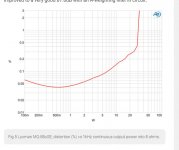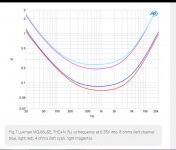Hi,
I would like to ask if there's a target ratio between harmonics (2nd, 3rd, 4th, etc...) and phases that you chase to get an ideal THD, or at least some guidelines to follow. I've found something here ( https://www.diyaudio.com/forums/tubes-valves/362361-check-harmonics-thd.html ) but not so much.
I've some PP designs that have a predominant 3rd harmonic and then all others at least 10 times lower, I have some others with odd harmonics that are reduced to 1/3rd of the previous ones, others reduced to half the previous one, etc...
What is the preference in SE designs between even and odd harmonics?
Do you generally prefer to have lower THD at low to medium power, then a steeper slope of THD at high wattages, or a sacrificate the THD at lowest volumes to have a flatter THD vs Power curve?
Resuming: what are you looking at when designing a new amp in these three fields?
- ratios between harmonics;
- phases;
- slope of harmonics vs power.
Thank you in advance
Roberto
I would like to ask if there's a target ratio between harmonics (2nd, 3rd, 4th, etc...) and phases that you chase to get an ideal THD, or at least some guidelines to follow. I've found something here ( https://www.diyaudio.com/forums/tubes-valves/362361-check-harmonics-thd.html ) but not so much.
I've some PP designs that have a predominant 3rd harmonic and then all others at least 10 times lower, I have some others with odd harmonics that are reduced to 1/3rd of the previous ones, others reduced to half the previous one, etc...
What is the preference in SE designs between even and odd harmonics?
Do you generally prefer to have lower THD at low to medium power, then a steeper slope of THD at high wattages, or a sacrificate the THD at lowest volumes to have a flatter THD vs Power curve?
Resuming: what are you looking at when designing a new amp in these three fields?
- ratios between harmonics;
- phases;
- slope of harmonics vs power.
Thank you in advance
Roberto
Too many variables to solve your question.
THD depends on transformer design, bias arrangement, drive capability and overall performance of the design, plus many more variations due to wiring type and chassis layout etc.
THD depends on transformer design, bias arrangement, drive capability and overall performance of the design, plus many more variations due to wiring type and chassis layout etc.
Hi JonSnell,
thanks for your feedback, I'm a newbie in Hi-Fi field and I've built some IA with tubes for myself and friends, so I know I ask simplified questions (or too wide ones).
I've seen this post by kokoriantz ( Why we need to check on the harmonics and THD? ) that gave some guidelines, and some posts of Nelson Pass too, but I'd like to know more about that.
thanks for your feedback, I'm a newbie in Hi-Fi field and I've built some IA with tubes for myself and friends, so I know I ask simplified questions (or too wide ones).
I've seen this post by kokoriantz ( Why we need to check on the harmonics and THD? ) that gave some guidelines, and some posts of Nelson Pass too, but I'd like to know more about that.
A few weeks ago I asked a similar question, its complicated, especially when different stages interact harmonically. I was thinking of individually choosing the operating point of each stage based on achieving a higher 2nd THD proportion for that stage. But that all falls apart when the harmonics combine across stages to cancel/reinforce, etc.
Newbie question - Selecting oper. point by harmonic dist. 2nd vs 3rd (my goal?)
Newbie question - Selecting oper. point by harmonic dist. 2nd vs 3rd (my goal?)
Thanks Windcrest77,
my question is more related to the overall response of the whole amp, not single stages.
But I totally agree that part of the magic of simple amps is in the simplicity of the way few stages work together.
my question is more related to the overall response of the whole amp, not single stages.
But I totally agree that part of the magic of simple amps is in the simplicity of the way few stages work together.
There was work done about 90 years ago about this. It was reworked in the 1970s. I'll see if I can dig it up, but basically the subject was harmonic masking and what harmonic profiles could, or could not be heard.
I think that when I started looking at you PP design on LT spice I did come to the conclusion that there was some distortion cancellation between the LTP driver and the non-linearities of the output devices. However its very dependent on the valve models used and I think best design practise is to get each bit as linear as possible. LT spice always uses matched devices and its worth putting in some mismatch to see what happens.
Certainly THD should be good at low powers - take crossover distortion for example.
Certainly THD should be good at low powers - take crossover distortion for example.
Last edited:
This might give you a path to further investigations:
What "THD" is considered "HiFi"?
Thank you very much!
- Dominant even order harmonics sound "warm", "soft" "round"
- Dominant odd order harmonics sound "cold" "edgy" "brittle" (but worse above 1KHz than below.)
- Suppression of the higher harmonics sounds "dull"
- A rise in higher harmonics can sound "bright" or even shrill.
And that's just measured on steady state signals. Knowing what an amp does under dynamic conditions is another can of worms!
So I should try to lightly unbalance a PP in order to add even order harmonics and create a more homogeneous fall of harmonics, even and odd ones together?
I'd like to add a gnfb control on my cascoded-LTP EL34 amp (as I do for my guitar amps) in order to adapt the harmonics to the level I'm listening to.
This is what I get now on LTSpice at 52 Wrms, but based on the information I've got here, it's not good to have a 3rd harmonic that is 10 times higher than all other harmonics, and should be better to have a more balanced amount of all of them, and a bit more of 2nd.
Code:
Harmonic Frequency Fourier Normalized Phase Normalized
Number [Hz] Component Component [degree] Phase [deg]
1 1.000e+03 2.867e+01 1.000e+00 -0.03° 0.00°
2 2.000e+03 2.410e-02 8.406e-04 -87.61° -87.58°
3 3.000e+03 1.558e-01 5.436e-03 0.02° 0.05°
4 4.000e+03 1.467e-02 5.117e-04 -89.27° -89.24°
5 5.000e+03 1.191e-02 4.155e-04 -176.29° -176.26°
6 6.000e+03 1.084e-03 3.782e-05 95.36° 95.39°
7 7.000e+03 2.360e-02 8.230e-04 2.17° 2.20°
8 8.000e+03 6.300e-04 2.197e-05 86.74° 86.77°
9 9.000e+03 1.310e-02 4.569e-04 -179.41° -179.38°
Total Harmonic Distortion: 0.561911%(0.562431%)Beginner's luck! I have to say that when I bought those two monoblocks I had absolutely no idea what they would have become, and I'm really happy with that amp.I think that when I started looking at you PP design on LT spice I did come to the conclusion that there was some distortion cancellation between the LTP driver and the non-linearities of the output devices.
How would you do that?LT spice always uses matched devices and its worth putting in some mismatch to see what happens.
Indeed I think the variable gnfb will help me understand how to set it, and then do some measurements thanks to the help of some friends.Certainly THD should be good at low powers - take crossover distortion for example.
No loudspeakers at all, I'll wait a DNC: Digital to Neural Converter.No THD at all, I want to hear the original as it was. NTL, your loudspeaker will be the limit.🙂
So for example if you use say a 12AU7 pair, try 12AU7+12BH7 to see what the mismatch does. Or a J111 and J112. Deliberately introduce imperfections into your design to see what happens and how sensitive it is. As far as getting some second harmonic in not sure, if you have a LTP stage try a pot in the cathode to unbalance the DC, or different plate resistors or bias the EL34 at different values. Bias the first stage wrong. Will work well on your guitar.
I agree with jhstewart. Design goal should be lowering all harmonics as much as possible, not trying to concoct a perfect cocktail of different harmonics.
Yes, speakers distort, but some more and others less.
Yes, speakers distort, but some more and others less.
Maybe, I wish I knew more and that there was more research on the topic. There hasn't been much that I've seen in the past 40 years. Many of the balanced circuits I've seen suppress H4, sometimes it's absent. You might read that balanced or P-P circuits suppress even order harmonics. From what I've seen that isn't universal, but H4 is almost always suppressed. H2 not always.So I should try to lightly unbalance a PP in order to add even order harmonics and create a more homogeneous fall of harmonics, even and odd ones together?
I'll look at some of the old research, I used to know it better. Generally harmonics that decrease evenly as the order increases will be masked, and should be inaudible.
Luxman has a recent tube amp MQ88, a replica of an old circuit but the output triodes are replaced by KT88 wired in triode mode. It is merely 2x25w instead of 2x75w possible with a pair of KT88, for lower distortion? On the contrary for higher distortion of odd harmonics but of opposite phase.
Listening #189: Luxman MQ-88uSE Measurements | Stereophile.com
When you consider S/N of less than 80db, a simple <2$ kit of TDA 2040/LM1875, out performs by far the specs.
Listening #189: Luxman MQ-88uSE Measurements | Stereophile.com
When you consider S/N of less than 80db, a simple <2$ kit of TDA 2040/LM1875, out performs by far the specs.
Attachments
Last edited:
Thanks kokoriantz,
something like this? It's how I want to modify my BHEL84 with a cascoded LTP (triode on bottom and BJT on top). This is at 18 Wrms:
something like this? It's how I want to modify my BHEL84 with a cascoded LTP (triode on bottom and BJT on top). This is at 18 Wrms:
Code:
Harmonic Frequency Fourier Normalized Phase Normalized
Number [Hz] Component Component [degree] Phase [deg]
1 1.000e+03 1.684e+01 1.000e+00 -1.03° 0.00°
2 2.000e+03 1.858e-03 1.104e-04 -158.32° -157.29°
3 3.000e+03 4.945e-02 2.937e-03 -123.85° -122.83°
4 4.000e+03 1.680e-03 9.978e-05 91.10° 92.12°
5 5.000e+03 3.921e-02 2.329e-03 -99.81° -98.79°
6 6.000e+03 2.568e-03 1.525e-04 114.94° 115.97°
7 7.000e+03 2.627e-02 1.560e-03 -16.02° -14.99°
8 8.000e+03 5.529e-04 3.284e-05 74.81° 75.83°
9 9.000e+03 1.486e-02 8.824e-04 -51.00° -49.97°
Total Harmonic Distortion: 0.416037%(0.432977%)Thanks!So for example if you use say a 12AU7 pair, try 12AU7+12BH7 to see what the mismatch does.
In that case I usually bias first two stages "quite well", 3rd usually cold and 4th "quite well" again, then a cathode follower to drive the equalizer. But that's another story.Bias the first stage wrong. Will work well on your guitar.
I'll look at some of the old research, I used to know it better. Generally harmonics that decrease evenly as the order increases will be masked, and should be inaudible.
Thanks again! I remember Nelson Pass saying that, based on his tests, people likes amps with predominanti 2nd or predominant 3rd, but not both together. Probably due to increased unpleasant IMD? I will try some unbalance of the LTP starting from perfect DC balance.
- Home
- Amplifiers
- Tubes / Valves
- THD Harmonics' ratio and phases for SE and PP amps

